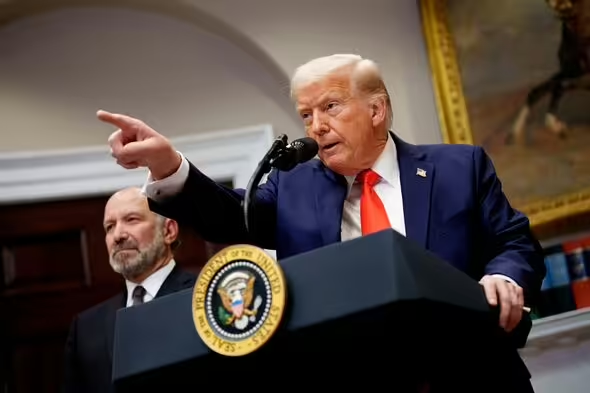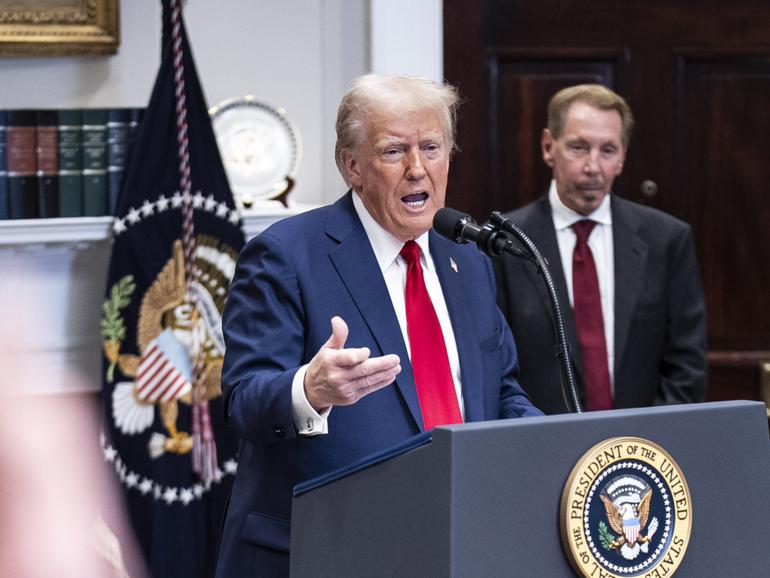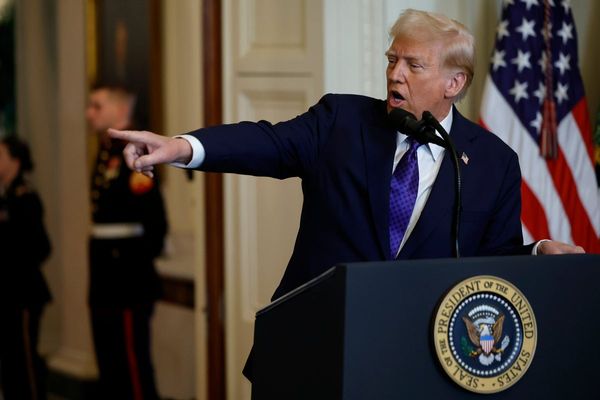
US president has paused all American military aid to Ukraine after accusing his Ukrainian counterpart of not wanting peace
Donald Trump is considering lifting US sanctions on Russia after announcing a pause on American military support to Ukraine, according to reports.
It emerged overnight that the US president was halting aid to the war-torn eastern European country until Volodymyr Zelensky is willing to engage in what Mr Trump views as good-faith negotiations with the US.
An unnamed White House source told Reuters that Mr Trump is also drawing up a plan to relieve US sanctions on Russia in a bid to improve economic and diplomatic relations with the Kremlin.
It comes after Sir Keir Starmer insisted during a summit in London at the weekend that a European peacekeeping force in Ukraine would need “strong US backing”

In a move that has sent shockwaves through the international community, former President Donald Trump has reportedly devised a controversial plan to lift sanctions on Russia, a decision that comes on the heels of a highly publicized and contentious exchange with Ukrainian President Volodymyr Zelensky.
The implications of this strategy are profound, raising questions about the future of U.S. foreign policy, the stability of Eastern Europe, and the global balance of power.
While the details of Trump’s plan remain shrouded in secrecy, insiders suggest that it represents a dramatic shift in America’s approach to the ongoing conflict between Russia and Ukraine, one that could have far-reaching consequences.
The relationship between Trump and Zelensky has been fraught with tension since the earliest days of Trump’s presidency. Their interactions have often been characterized by mutual distrust and public disagreements, particularly over issues related to Ukraine’s sovereignty and its efforts to resist Russian aggression.
Trump’s recent comments, which included a scathing critique of Zelensky’s leadership, have only deepened the rift between the two leaders. In a series of public statements, Trump accused Zelensky of being ungrateful for U.S. support and suggested that Ukraine’s government was not doing enough to combat corruption.
These remarks were met with swift condemnation from Zelensky, who defended his country’s efforts to reform and called for continued international support in the face of Russian hostility.

The decision to lift sanctions on Russia, if implemented, would mark a significant departure from the policies of the Biden administration, which has maintained a hardline stance against Moscow in response to its invasion of Ukraine.
Sanctions have been a key tool in the U.S. strategy to pressure Russia to withdraw from Ukrainian territory and to deter further aggression.
By removing these sanctions, Trump’s plan could undermine the international effort to hold Russia accountable for its actions and embolden President Vladimir Putin to pursue further territorial ambitions.
Critics argue that such a move would send a dangerous message to authoritarian regimes around the world, signaling that the U.S. is willing to compromise its principles for short-term political gain.
The potential lifting of sanctions has also raised concerns among America’s allies in Europe, many of whom have been staunch supporters of Ukraine and have imposed their own sanctions on Russia.
European leaders fear that Trump’s plan could weaken the unity of the transatlantic alliance and create divisions that Russia could exploit. There is also the risk that lifting sanctions could lead to a resurgence of Russian influence in Eastern Europe, particularly in countries that were once part of the Soviet Union.
For nations like Poland and the Baltic states, which have long viewed Russia as a threat to their security, the prospect of a U.S. policy shift is deeply alarming.
Trump’s plan, however, is not without its defenders. Some argue that lifting sanctions could pave the way for a negotiated settlement to the conflict in Ukraine, one that would bring an end to the bloodshed and allow for the rebuilding of the war-torn country.
Proponents of this view suggest that the current strategy of economic pressure has failed to achieve its goals and that a new approach is needed.
They point to the devastating impact of the war on Ukraine’s economy and civilian population, arguing that a diplomatic solution is the only way to prevent further suffering.
Trump himself has hinted at this possibility, suggesting that his plan could lead to a “great deal” that would benefit both Russia and Ukraine.
Yet, the idea of lifting sanctions in exchange for peace is fraught with risks. Critics warn that such a move could reward Russia for its aggression and set a dangerous precedent for future conflicts.
There is also the question of whether Putin would be willing to negotiate in good faith, given his track record of violating international agreements. Many analysts believe that Russia’s ultimate goal is to reassert its dominance over Ukraine and other former Soviet states, and that any concessions made by the U.S. would only serve to advance that objective.
The fear is that Trump’s plan could inadvertently strengthen Russia’s position, both militarily and diplomatically, at a time when Ukraine is most vulnerable.
The domestic political implications of Trump’s plan are equally significant. The decision to lift sanctions on Russia is likely to be met with fierce opposition from both Democrats and Republicans in Congress, many of whom have been vocal in their support for Ukraine.

There is also the potential for a backlash from the American public, particularly among those who view Russia as a hostile adversary.
Trump’s critics have already accused him of being too cozy with Putin, and this latest move could further fuel those accusations.
For Trump, however, the plan may be part of a broader strategy to position himself as a peacemaker and to differentiate himself from other potential presidential candidates in the 2024 election.
The international reaction to Trump’s plan has been swift and largely negative. Ukrainian officials have expressed outrage at the idea of lifting sanctions, with some warning that it could lead to a complete collapse of their country’s defenses.
Zelensky, in a recent interview, described the plan as a “betrayal” of Ukraine’s trust and vowed to continue fighting for his country’s independence. European leaders, meanwhile, have called for unity in the face of Russian aggression and urged the U.S. to maintain its current policy.
The United Nations has also weighed in, with Secretary-General António Guterres warning that any move to lift sanctions could undermine global efforts to uphold international law.
As the debate over Trump’s plan continues, the situation on the ground in Ukraine remains dire.
The war has already claimed thousands of lives and displaced millions of people, and there are fears that the conflict could escalate further if international support for Ukraine wanes.
The Ukrainian military, despite receiving significant aid from the U.S. and its allies, is struggling to hold back Russian forces in the eastern part of the country.
The prospect of a reduction in that aid, whether through the lifting of sanctions or other means, could have devastating consequences for Ukraine’s ability to defend itself.
Looking ahead, the future of U.S.-Russia relations remains uncertain. Trump’s plan, if implemented, could lead to a thaw in relations between the two countries, but it could also deepen existing tensions and create new challenges for global security.
The Biden administration has made it clear that it has no intention of lifting sanctions on Russia, and it is likely that any attempt by Trump to do so would face significant legal and political hurdles.
Nevertheless, the mere suggestion of such a move has already sparked a heated debate about the direction of U.S. foreign policy and the role of America in the world.
In conclusion, Trump’s plan to lift sanctions on Russia represents a bold and controversial gamble, one that could reshape the geopolitical landscape in ways that are difficult to predict.
While the potential benefits of such a move are clear, the risks are equally significant, and the stakes could not be higher.
As the world watches and waits to see what happens next, one thing is certain: the consequences of this decision will be felt far beyond the borders of Ukraine and Russia, and they will reverberate for years to come.
News
BREAKING: Lily Collins’ EMOTIONAL 36th Birthday—‘First as a Mama!’ Shares RARE Photos of Baby Tove & Husband Charlie!
Lily Collins celebrated her ‘first birthday as a mama’ as she turned 36 on Tuesday – and shared sweet family snaps…
BREAKING: White Lotus Star Alexandra Daddario TURNS HEADS at Australian Grand Prix—VIP Photos LEAKED
Alexandra Daddario flaunted her luxurious life at the Formula One Grand Prix in Melbourne. The White Lotus star, 39, was pictured on the grid…
I’m Convinced Alexandra Daddario Is The Perfect Casting Choice To Play Wonder Woman In James Gunn’s DCU
Alexandra Daddario has all the needed elements to bring Wonder Woman to life in the new DC Universe and make her performance as memorable…
Zoe Saldaña Says Oscars Rejecting ‘Avatar’ Acting Is ‘Quite Deflating’: ‘You’re Overlooked and Then Minimized and Completely Disregarded’
Zoe Saldaña, the acclaimed actress known for her roles in blockbuster franchises like Avatar and Guardians of the Galaxy, has never been one…
BREAKING: Zoe Saldaña’s FORGOTTEN Ballet Movie DESTROYS Her Oscar Role—Fans SCREAM ‘This Is Her REAL Masterpiece!’
Emilia Pérez is not the first time Zoe Saldaña has danced on screen, and her ballet performance in Center Stage showcased her musical…
BREAKING: Pixar’s NEW Movie Trailer LEAKED—Starring Oscar-Winning SUPERSTAR! Fans SCREAM ‘BEST ANIMATION EVER!’
After winning the Oscar for Best Supporting Actress for her performance in Emilia Pérez, Zoe Saldaña’s next movie will be the Pixar sci-fi movie Elio….
End of content
No more pages to load












